By Angela Stringfellow on Jul 12, 2019 2:21:52 PM

The stressors associated with family caregiving are well-documented; you can find plenty of studies that illustrate the various emotional issues that arise from being an unpaid family caregiver, but it’s not often that the finances are given the spotlight. That said, caregivers that do not go into a caregiving arrangement ready and empowered to face the economic challenges ahead are more likely to experience stress and other financial repercussions.
In the Forbes article, “The Financial and Personal Toll of Caregiving,” we learn that Americans spend roughly $190 billion per year on their care recipients for out-of-pocket expenses. And, in order to do so, 63% of these caregivers are forced to dip into savings or sell and cash in on assets.
It’s a scary situation that can’t always be avoided, but that doesn’t mean that there aren’t ways to cut out-of-pocket expenses down – or prepare to get rid of them altogether. This often requires a keen understanding of the legalities that go into becoming a caregiver, key information that can lead you to a monthly salary, tax breaks, and more. This knowledge also includes plenty in the way of documentation and legal pathways.
Below, you will find 50 legal tips to help family caregivers navigate the confusing legal and financial landscape, get the necessary legal documents in order, and cope with financial challenges. This expert advice is designed to streamline your legal and financial strategy so that you can focus on what’s important: caring for your loved one.
Tips on Legal Planning for Caregivers
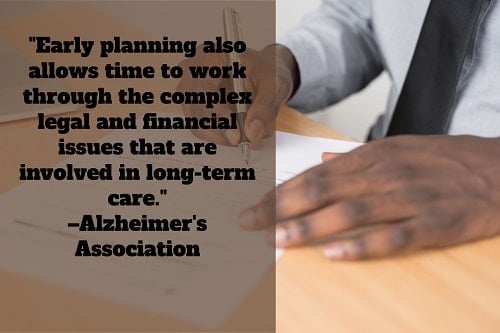
- Plan ahead before your loved one gets sick. “Making legal plans in advance is important for several reasons: Early planning allows the person with dementia to be involved and express his or her wishes for future care and decisions. This eliminates guesswork for families and allows for the person with dementia to designate decision makers on his or her behalf. Early planning also allows time to work through the complex legal and financial issues that are involved in long-term care.” – Planning Ahead for Legal Measures, Alzheimer’s Association; Twitter: @alzassociation
- Research and understand ‘decisional capacity’. “Be aware that capacity is not an all-or-nothing thing. A family member may have some capacities at some times but are gradually losing others. Financial capacity and financial judgment often decline before other functions. So it is important to get help to evaluate capacity. It will help give you a clearer picture of the current level of functioning, underlying diagnoses, ways to improve capacity, and the likely progression of symptoms. Find your local resources through the Eldercare Locator at www.eldercare.gov or call 1-800-677-1116.” – Ten Legal Tips for Caregivers, American Bar Association; Twitter: @ABAesq

- Review plans frequently. “Changes in personal situations – such as a divorce, relocation, or death in the family – and in State laws can affect how legal documents are prepared and maintained. Review plans regularly, and update documents as needed.” – Legal and Financial Planning for People with Alzheimer’s, National Institute on Aging; Twitter: @Alzheimers_NIH
- Make sure that your loved one is aware of their rights. “In some cases, the person receiving care may be reluctant to share such personal financial and legal information with the caregiver, because he or she may still feel up to the task of managing his or her own affairs.
“If you are a caregiver in this situation, inform the person you’re taking care of that your concern is about being able to find these important documents in the event of an emergency, to help ensure their wishes are being met. You don’t need to see the actual documents – you just need to know where to find them in a crisis.” – Organizing Financial and Legal Documents –Caregiver Advice, Elizz; Twitter: @elizztweets

- Consider limiting access to financial information, especially for memory care patients. “There are some individuals that may try and take advantage of a person suffering from dementia or the person themselves can put their own funds at risk. Consider giving limited access to the person to pay small bills while holding back access to larger funds such as retirement funds, stocks, etc. In some cases, banks have their own documents that need to be signed for this kind of money management. Again, put this in place as soon as possible so that the documents can be signed before they are unable.” – National Caregivers: Our Favorite Legal and Financial Tips, Alzheimer’s Association; Twitter: @alzassociation
- Make smart financial decisions. “Manage money and other assets wisely. Financial caregivers may be in charge of daily, unexpected and future expenses their loved one may incur. Especially if the beneficiary has a fixed income or limited finances, it is extremely important that caregivers minimize unnecessary costs and budget accordingly to ensure that all money is properly allocated.” – 6 Money Tips for Caregivers, Lincoln Savings Bank; Twitter: @MyLSB
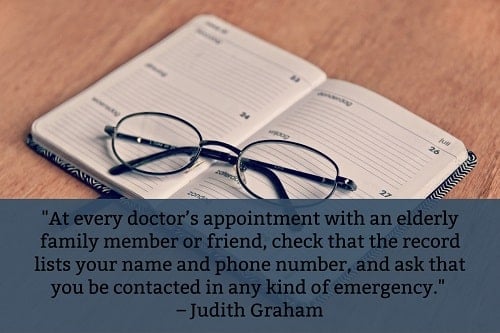
- Ensure that all records list the main caregiver’s name and contact information. “At every doctor’s appointment with an elderly family member or friend, check that the record lists your name and phone number, and ask that you be contacted in any kind of emergency.” – Judith Graham, A Practical To-Do List for Family Caregivers, Kaiser Health News; Twitter: @KHNews
- When possible, develop a ‘partners-in-care’ relationship. “Most parents still feel they should be the ones in control. After all, they are the parent. However, as the parent’s mental competency wanes, the access to their information and desires is also lost. If you let them be in control while still allowing you to do what needs to be done, that will help ease their distress. Begin the conversation and preparation where they can control what their desires and wishes are for the future, so that you can work together with them to put the right plans in place. Let them know that their wishes are the only things that are important. You are there to assist them. You are ‘Partners-in-Care’.” – Stuart Furman, Esq., Elder Law Attorney, Ask an Expert: Legal, A Place for Mom; Twitter: @APlaceforMom

- Educate yourself on changing caregiving laws. “Be attuned to changes in financial ability and take appropriate action. Stay up to date on changes in the laws affecting seniors and implement accordingly.” – Your Role As a Financial Caregiver, American Bankers Association; Twitter: @ABABankers
- Know the difference between ‘guardian’ and ‘conservator’. “A caregiver of an individual who no longer has the legal capacity to execute powers of attorney or trusts might have to become that individual’s guardian or conservator. A guardian has the legal authority to make decisions about the lifestyle and well-being of another person. The decisions a guardian may make include where a person may live, what care and medical treatment will be provided, and what religious and educational activities will be made available. A conservator has legal authority to manage another person’s financial affairs.” – Legal Issues of Caregiving: Planning for Incapacity, Cleveland Clinic; Twitter: @clevelandclinic

- Consider suggesting long-term care insurance for your loved one before they need it. “Worth investigating to see if your senior can afford the cost of this insurance, which will help pay the cost of home nursing care, home health care, and other specific daily needs, depending on the plan. It is important to understand the plan and compare it with others to get what will fit your senior’s needs. It is also more cost effective to purchase it before it is needed, such as after a debilitating disease strikes.” – Kathy Birkett, Protecting Seniors’ Financial Well-Being – Family Caregiver Quick Tip, Senior Care Cornerâ; Twitter: @SrCareCorner
- Keep all other family members in the loop about end-of-life planning—and record their responses. “A difficult but important aspect of caring for someone is preparing for her or his end-of-life stage. While not always an easy issue to think about, planning well in advance for end-of-life care can help protect a care recipient’s well-being and also provide peace of mind for everyone involved. People usually have strong preferences about how they would like to live in the final stages of life and what types of care they do and do not want. It is very important to involve care recipients and other family members in these conversations and decisions.” – Financial Steps for Caregivers: What You Need to Know About Protecting Your Money and Requirement, WISER; Twitter: @wiserwomen

- Sell or rent property that is not being used. “If your parents are in an assisted living community and are not going to be returning to the family home, you need to strongly consider the benefits of selling it instead of trying to save it. Unless you or another family member will be moving into it permanently and taking on all of the affiliated financial responsibilities, you cannot expect the available finances to pay for that home and assisted living. In fact, selling the family home might provide money for several years of care.” – Karen Coffey-Carney, 6 Family Caregiver Financial Tips for Assisting Elderly Parents, SecondFamily Senior Care
- In emergency situations, be prepared for higher or upfront dental costs. “Due to complicated billing processes and slow government reimbursement, there aren’t many dentists that accept Medicaid. To find a dentist in your state that accepts Medicaid, contact your State Department of Health. Keep in mind that because there are a limited number of dental practices that accept Medicaid, seniors might have to travel to receive these services. – Tony Rovere, 19 Free and Discounted Services for Seniors and Their Caregivers, AgingCare; Twitter: @AgingCare

- Investigate special caregiving groups and credits for veterans. “If your care recipient is a veteran in the U.S., home health care coverage, financial support, nursing home care, and adult day care benefits may be available. Some Veterans Administration programs are free, while others require co-payments, depending upon the veteran’s status, income, and other criteria.” – Melinda Smith, M.A. and Jeanne Segal, Ph.D, Family Caregiving, HelpGuide; Twitter: @helpguideorg
- Make sure that your family is on the same page with your caregiving role. “Hold a meeting with all family members concerned to decide who will be involved with caregiving. You may choose to include the ill family member as well depending on the individual situation. In your meeting, discuss topics such as health, legal, finances, transportation, and other potential care options, such as respite care. These topics are covered in detail below. Then discuss the support roles each family member will play. You’ll likely be more effective if you ask each person how they want to contribute.
“If you are the sole caregiver, you’ll want to set up a network of support – professionals, friends, neighbors, church members, volunteers – who can help along the way. There will be times when you are unable – and shouldn’t attempt – to do it all. You’ll need people in place who can cover for you. For example, is there a neighbor you can rely on to handle transportation to a doctor’s appointment should you be unable? Get together with family periodically to discuss the challenges of providing care. You may need to reassign caregiving duties or pick up the slack if a family member is no longer able to contribute.” – Help for Caregiving Seniors, Seniorliving.org

- Know when it’s time to step in. “Look for signs of money problems such as trouble counting change, paying for a purchase, calculating a tip, balancing a checkbook, or understanding a bank statement. The person may be afraid or worried when he or she talks about money.” – Managing Money Problems in Alzheimer’s Disease, National Institute on Aging; Twitter: @Alzheimers_NIH
- When a family argument is brewing over caregiving, seek a legal advisor. “As parents age, each sibling will play different roles in the care given, based on proximity to the parent, willingness to take responsibility, financial capabilities to help out, relationship with the parent, etc.
“Maybe you are there day in and day out caring for your mom and realize she needs more care and supervision than you can provide, but your sister is resistant to the idea of putting your mom in a nursing home or assisted living facility. Family dynamics are complicated and when stressful situations like this arise, it’s best to have an outside, unbiased person who can help you make this very important decision. Eldercare specialists can conduct an assessment of your parent’s individual needs and create a care plan. They also compare housing and long-term care provider options and can negotiate rates when available.” – Dennis Healy, Executive Team Member at ARAGâ, Get Expert Advice on 4 Common Caregiver Legal Issues, DailyCaring; Twitter: @DailyCaring

- Be vigilant about possible elder abuse. “There are many kinds of abuse that seniors can fall victim to at the hands of strangers and even the people they are closest to. While those with Alzheimer’s disease and other forms of dementia are considered the most vulnerable, cognitively sound individuals are also prone to being defrauded and scammed.” – Marlo Sollitto, 5 Common Legal Issues That Caregivers Face, AgingCare; Twitter: @AgingCare
- A financial power of attorney must be set up while your loved one has the capacity for decision-making. “Becoming one’s guardian (or conservator as it is called in some states) requires the filing of a legal petition in the appropriate local court. The proceedings are complicated enough to require the help of legal counsel as a practical matter. Your mother will also have a right to legal counsel, and the proceedings may involve an investigation of her circumstances, an assessment of her mental capacity, and a court hearing. If you are appointed as her guardian, you will have to handle her affairs under the supervision of the court and file regular accountings with the court. It all adds up to an expensive and cumbersome form of financial management, intended to protect the interests of the incapacitated person.
“That is why the authorization of a trusted family member to handle one’s affairs under a financial power of attorney is usually the preferred strategy, but that arrangement must be set up while one’s parent still has the capacity to understand the nature and consequences of setting up a power of attorney, and of course, there must be a trustworthy person available whom the parent wishes to appoint.” – Charles P. Sabatino, Your Caregiving Questions Answered: Legal Matters, AARP; Twitter: @AARP

- Family of nursing home residents will find advocacy through their ombudsman. “The Long Term Care Ombudsman (LTCO) advocates for residents in nursing homes and assisted living communities. While the LTCO does not license or regulate facilities, they protect the rights of residents and can provide education to family members and caregivers about the state’s licensing authority.” – Caregiver Corner, ACL Eldercare; Twitter: @EldercareLoc
- Encourage loved one to set up automatic payments, if possible. “You can arrange for water, electric, health insurance, mortgage, and other regular commitments to be paid electronically out of your loved one’s checking account. This makes bill paying easier and prevents hassles and interruptions in service if required payments aren’t made. You also may be able to arrange to be notified if your loved one misses a payment.” – Basic Financial Caregiving, National Caregivers Library

- Have an honest discussion about a loved one’s current financial situation before they come incapacitated. “Try to get an accurate assessment of your loved one’s financial situation. That’s especially true if your relative is secretive about his or her finances. Claire Berman, in her 1996 book ‘Caring for Yourself While Caring for Your Aging Parents,’ tells of a man who was led to believe his 87-year-old father, living a distance away, was managing OK money-wise. Then a neighbor called to say his dad’s electricity had been turned off. ‘There was, in fact, no money to speak of,’ the man said. ‘Dad simply had been too proud to tell me that, and I’d been too respectful of his privacy to press him on the money issue.’ The two then spoke frankly about finances and how the son could help. ‘It’s the kind of father-son talk,’ he said, ‘that should have taken place years earlier’.” – How to Help a Loved One with Finances, The Caregiver Foundation; Twitter: @tcfoundation
Tips on Preparing Legal Documents
- Use a third-party when preparing documents. “Sometimes, even when approached with sensitivity and respect, loved ones resist discussing such personal matters and plans. Know that you can only do your best to help them. If they refuse to accept assistance or share information but can still make their own decisions, you may not be able to do anything. In that case, be there for whatever help they allow you to provide and choose to act differently in terms of your own long-term planning. Often it helps to bring in an objective third party, such as a counselor, doctor, lawyer or mediator.” – Amy Goyer, Family and Caregiving Expert at AARP, Legal Preparations for Caregiving, AARP; Twitter: @AARP

- Include the will and power of attorney in the same document. “These two objectives can often be handled in a single document. The living will/advance directive allows you to name a person to direct your health care when you cannot do so. This is your ‘health care representative’ or ‘attorney-in-fact’ for health care. Make sure you choose someone who will follow your instructions and insist that your wishes for end-of-life care be respected. You should discuss your choices with your doctor and your identified health care representative to ensure they understand and agree to honor your wishes. If your doctor cannot agree to honor your living will/advance directive, that doctor should refer you to one who will.” – Medical, Financial, & Legal Planning, UCSF Memory and Aging Center; Twitter: @UCSFmac
- Ensure that you get a durable power of attorney signed. “Some powers of attorney are in effect for a limited period of time and can terminate if the person who authorized an agent becomes incapacitated. If you intend to have a power of attorney in order to make financial decisions for someone who has impaired cognitive abilities and for whom you are providing care, make sure the person drafts what’s known as a durable power of attorney. This allows you to remain the agent even if the person is incapacitated.” – Ilana Polyak, 3 Legal Documents Caregivers Need, Health; Twitter: @goodhealth
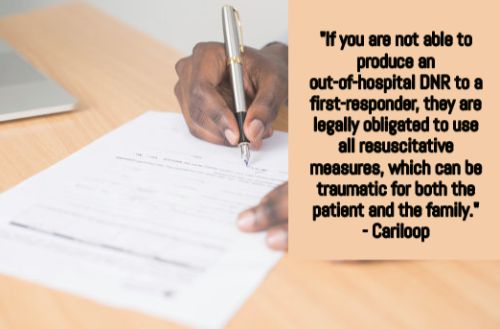
- Keep a DNR available at all times. “An out-of-hospital DNR is only necessary if your loved one does not want to be revived by paramedics in the event of a fatal accident outside of the hospital (car accident, heart attack, severe fall at home, etc.). Be sure to have this document available at all times so that you can quickly show it to a first-responder. If you are not able to produce an out-of-hospital DNR to a first-responder, they are legally obligated to use all resuscitative measures, which can be traumatic for both the patient and the family. Out-of-hospital DNRs must also be signed by a doctor (in most states), so, if your family member has decided they do not want to be revived, then it is crucial to get this done. You may have signed a DNR in the hospital or at another facility, but those documents do not apply outside of those facilities.” – Three Documents Every Caregiver Should Have, Cariloop; Twitter: @cariloop
- Gather all insurance-related information. “First, consider any insurance documents that you own that might pay out if you have a medical emergency, disability, illness or death. You’ll want to list any disability policies, life insurance, health care directive and long-term care policies in this section. It’s important that you specify the exact location of these documents, policy numbers and contact phone numbers, and be clear as to how your medical and prescription expenses are paid. List any nurses, or other medical providers that administer services in your home. Come up with a budget, and if possible, have a legal expert take a look at it.
“You’ve probably heard this before. It will help you and your family even if you’re not caring for someone, but building a plan can keep loved ones from being a burden should they require caregiving. It can also help you, as you step into a caregiving role, learn about upcoming expenses and regular bills that need to be paid so that you are not surprised by unexpected costs.” – Sonya Edwards, 3 Tips for Managing Finances as a Caregiver, Guideposts; Twitter: @guideposts

- Get all insurance policies in order. “Since we’re on the topic of insurance, next list all current insurance policies in the following categories: Dental, homeowners, flood, renters, automobile, business and supplemental insurance (AFLAC, etc.). Be as specific as you can on these policies, giving close attention to the company name, contact number and payment schedule.” – Stan Murray, Advanced Estate Planning: Information for Caregivers and Survivors, Investopedia; Twitter: @investopedia
- Prepare health care proxy documentation. “A properly signed Health Care Proxy gives caregivers the legal authority to make medical decisions. As soon as possible after diagnosis, a person with dementia should consider their wishes for future treatment and designate a Health Care Proxy. Once appointed, a Health Care Proxy can make medical decisions on another person’s behalf, including: choices regarding health care providers, medical treatment, and, in the later stages of the disease, end-of-life decisions. The Health Care Proxy form comes into effect when a physician determines that the person with dementia no longer has the capacity to make medical decisions.” – Important Documents, CaringKind; Twitter: @caringkindnyc

- Talk about including an organ donation section in the advance directive. “Most advance directives contain a section about organ donation where you can express your wishes as to whether or not you want to donate your organs upon your death. If your advance directive does not mention organ donation, you can write-in your wishes as to whether or not you want to donate your organs in the “comments” section of your document, or you can submit a separate letter of intent for organ donation (see below). Your family will ultimately decide whether or not to donate your organs. Being able to read your wishes about organ donation will make their decision-making much easier, and discussing your wishes with your family nowis the best way to help them make this decision.” – Organ Donation Information & Registration, U.S. Advance Care Plan Registry
- Collect all access information to financial institutions. “Make copies of financial statements, including bank and credit card statements, retirement account statements, and recurring bills. Establish online access to banking and credit card accounts and watch for any unusual or fraudulent activities. Collect the names, phone numbers and account numbers for her utilities, phone, and cable/internet suppliers.” – Tips for Long Distance Caregivers, Slutsky Elder Law

- Keep track of medical out-of-pocket costs. “There are a variety of items related to care giving that you can deduct on your tax return. That includes the cost of doctors visits, surgeries, lab work, in-home services, dental work, and supplies like false teeth or wheelchairs. Deduct expenses related to transporting your aging relative to medical appointments if that person can’t travel alone. Those expenses include mileage, parking, tolls, and even meals and lodging charged by a hospital if your main reason for being there is to get medical care.” – Francine Huff, Tax Planning Tips for Seniors, ElderCare Link
- Spend time getting acquainted with HIPAA release documentation and laws. “Well, although most people — and all clinicians — have heard of HIPAA, its rules and requirements are often misunderstood. So, for instance, families may assume they can’t report a relative’s worrisome behavior to the doctor, because their relative hasn’t given them permission to do so.
“Even worse: doctors and other clinicians sometimes refuse to disclose any information to families, and will incorrectly claim that HIPAA doesn’t allow them to do so. This can create extra confusion and stress for families, or can even sometimes put an older person at risk for harm. If you’ve been concerned about an aging parent’s health, or are otherwise helping someone with their health concerns, then it can be very helpful to understand HIPAA better.” – Leslie Kernisan, MD, MPH, 10 Things to Know about HIPAA & Access to a Relative’s Health Information, Better Health While Aging; Twitter: @drkernisan

- Get to know your state laws. “Your state may have specific laws regarding a caregiver’s authority to make health care decisions for your loved one. Typically, states have three ways to confer that authority: through personal representatives named in advance health care directives, specifically health care powers of attorney; through default surrogate decision-making laws; or through guardianship law. You’ll need to do a little digging to find out what your state’s laws require.” – Caregiver Rights, Where You Live Matters
- Keep original documents on hand and keep them safe. “Keep the original copy of the will in a fire-proof location, such as a bank safe deposit box or fire proof safe. Keep a copy of the will and originals of all other documents in a secure place at home where family members can access them in emergencies during non-business hours. Note that a will or advance directive left on a computer is not legal.” – Legal Issues for Caregivers, Family Caregivers Online; Twitter: @CaregiversTx
Financial Considerations for Caregivers
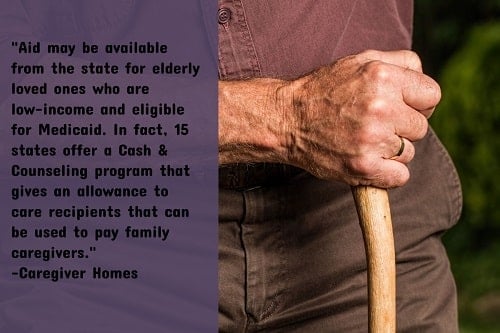
- Look into state aid for caregivers. “Aid may be available from the state for elderly loved ones who are low-income and eligible for Medicaid. In fact, 15 states offer a Cash & Counseling program that gives an allowance to care recipients that can be used to pay family caregivers. For caregivers who don’t live in one of the 15 Cash & Counseling states, other programs are available for low-income seniors who may not qualify for Medicaid. To learn about the financial aid programs available in your state, contact your local Medicaid office.” – Financial Support for Caregivers: The Ultimate Guide for Home Care Costs, Financial Aid, and Financial Planning for Caregivers, Caregiver Homes
- Think twice before leaving your job. “It is very easy to lose sight of your financial needs when you are considering leaving the workplace to perform the rewarding but difficult task of providing care. Before curtailing your working career, it will be crucial to assess the long-term financial impact of caregiving for your aging parents. In addition to losing a paycheck, you could also be missing out on years of service that are required in order to become vested in a defined benefits pension plan or to receive the company’s matching contribution in a 401(k) plan or to build Social Security benefits. Continued employment enables you to take advantage of opportunities for saving and accumulating compounded returns. Another consequence of leaving the workplace is the loss of current skills and connections to a profession.” – Financial Considerations for Caregivers, Strategic Wealth Planners; Twitter: @swsplan
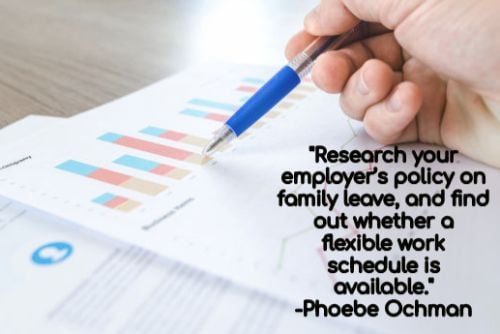
- Explore flexible work options. “Research your employer’s policy on family leave, and find out whether a flexible work schedule is available. Having conversations now in preparation for the future can decrease stress when you know all existing options.” – Phoebe Ochman, Director of Corporate Communications for Chapters Health System, Sandwich Generation Caregiver Preparation Tips: Plan Now for the Future, Chapters Healthâ System; Twitter: @Chapters_Health
- Get advice from a personal financial planner. “Find a financial planner who is experienced in elder care planning, this is one step that most families forget about. A financial planner is going to help you understand the assets necessary to pay for the desired level of care in the future. This can provide you with an invaluable experience where you learn about the need to preserve income/assets right now. They may also be able to help you make sure that all the financial affairs are in order.” – Caregiver Tips for Senior Financial Planning, Carlton Senior Living; Twitter: @CarltonSrSenior
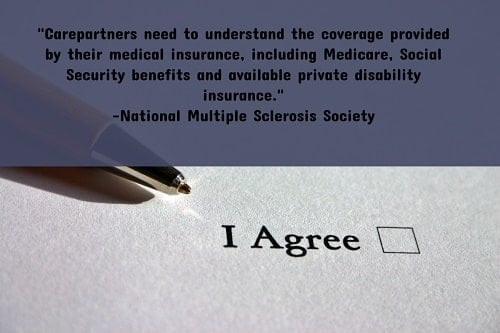
- Understand your financial rights as a caregiver. “Carepartners need to understand the coverage provided by their medical insurance, including Medicare, Social Security benefits and available private disability insurance. Some people may qualify for state programs such as public assistance, food stamps or Medicaid. Hospital or clinic social workers are good resources for information regarding these programs. Carepartners also need a clear understanding of the ADA and other legislation that provide protections concerning housing, transportation, recreation, and employment.” – A Guide for Support Partners, National Multiple Sclerosis Society; Twitter: @mssociety
- Look into your eligibility for a home and community-based services program. “Many seniors are eligible to opt into a home and community-based services program (HCBS). HCBS programs, such as services provided by Caregiver Homes, deliver ongoing support and care oversight to assist caregivers while providing them with a tax-free daily stipend to make the financial burden of caregiving easier to bear.
“These programs typically are available to Medicaid beneficiaries who receive in-home care. And, these programs are not limited to seniors; they often are available to people with intellectual or developmental disabilities, physical disabilities, or mental illnesses. Overall, the guidance and financial assistance HCBS programs provide to caregivers enable them to focus on providing quality care instead of worrying about financial problems.” – How to Become a Paid Caregiver for a Family Member: 6 Steps to Uncovering Financial Assistance Options for Family Caregivers, Caregiver Homes
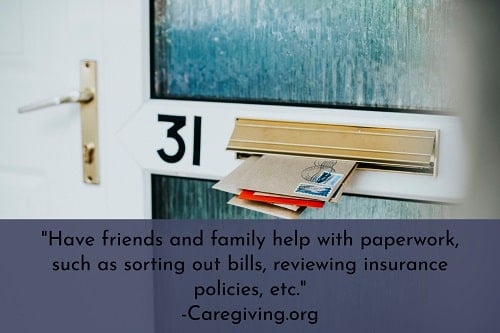
- Do not let unpaid bills hurt you or your loved one’s future. “Have friends and family help with paperwork, such as sorting out bills, reviewing insurance policies, etc. Do not let bills and correspondence pile up.” – Care for the Family Caregiver: A Place to Start, Caregiving.org
- Know your rights within the Family and Medical Leave Act. “If your employer doesn’t recognize these rights despite employing 50 or more people, approach your HR representative. You are legally entitled to these rights. If they or your employer seems unresponsive, you may need to schedule a special meeting to discuss these issues. Another option is to approach the Equal Employment Opportunity Commission (EEOC) – a federal agency with regional offices that enforces laws prohibiting discrimination in employment – to see if you can get help from them. If all else fails, there are many attorneys who specialize in these matters and will have suggestions to help protect your rights and job security.” – Ronnie Friedland, Legal and Financial Rights for Family Members as Caregivers, Care.com; Twitter: @caredotcom

- Learn about how your financial situation may change after the implementation of the RAISE Act (beginning in 2020). “Under the RAISE Act, HHS will create a national family caregiver strategy by bringing together federal agencies and representatives from the private and public sectors (like family caregivers, health care providers, employers and state and local officials) in public advisory council meetings designed to make recommendations.” – Richard Eisenberg, Senior Web Editor of NextAvenue, What the New RAISE Family Caregivers Act Will Do, Forbes; Twitter: @Forbes
- Research filial responsibility laws. “Currently, thirty states in the U.S. as well as Puerto Rico have passed these filial (due from a son or daughter) responsibility laws. In a nutshell, these filial support laws require adult children to financially support their parents if they are not able to take care of themselves or to cover unpaid medical bills, such as assisted living costs. This also includes food, clothing, shelter, and health care/medical needs of the parent. The following list contains states that have passed a form of this filial responsibility law and a link directly to their state statute, where possible. Click on the state to find more specific information about their filial law.” – Does Your State Law Require You to Support Your Aging Parent?, Medical Alert Advice; Twitter: @MedicalAlertTip

- Do not take on a loved one’s medical expenses or debt if you can’t handle it. “Don’t take on unmanageable debt for yourself. With your earning power cut as a caregiver, it may be very tempting to put expenses for a loved one or yourself on a credit card. If you do so, keep balances low and take advantage of low-interest offers. Rather than run the risk of high-interest credit card debt, look to community resources for help with lowering caregiving expenses. Look up your local Area Agency on Aging(N4A.org) or call 2-1-1 to research services available in your area that could cut costs.” – Lucy Lazarony, 7 Tips to Managing Your Finances as a Caregiver, Smart About Money; Twitter: @NEFE_ORG
- Caregiver spouses of veterans should look into Aid and Attendance Benefit. “The Aid and Attendance (A&A) Benefit is an Improved Pension benefit, meaning it is paid in addition to monthly pension. The A&A allows for Veterans and surviving spouses who require the regular attendance of another person to assist in eating, bathing, dressing, medication management, or taking care of the needs of nature to receive additional monetary benefits. It also includes individuals who are blind or a patient in a nursing home because of mental or physical incapacity. Assisted care in an Assisted Living community also qualifies.” – Financial Tips Every Senior Caregiver Need to Know, IntegraCare; Twitter: @IntegraCare

- Learn how to use the Dependent tax break so that it works in your favor. “You can claim a $500 nonrefundable credit for dependents who do not qualify for the child tax credit, including dependents such as elderly parents. Unlike a deduction, which lowers your taxable income, a tax credit is deducted from the taxes you owe.
“The Internal Revenue Service allows family caregivers to claim some individuals related by blood, marriage or adoption and even friends as dependents – if both parties meet the IRS requirements. If so, the caregiver can claim the dependent and the credit for other dependents on his or her federal tax return. A caution is that adding the dependent may impact your household health insurance costs if purchased through the Marketplace or if the dependent is eligible for Medicaid.” – Tax Tips for Caregivers, AARP; Twitter: @AARP
- Take a closer look at the disability tax credit (DTC). “If you’re taking care of someone who is dependent on you, and has a persistent physical or mental disability, you may be able to cut your income tax bill with the non-refundable disability tax credit (DTC). Depending on your province, the DTC is worth between $1,500 and $2,000 of combined federal and provincial tax relief.” – Farhana Uddin, 4 Important Tax Credits that Help Caregivers, Sun Life Financial; Twitter: @SunLifeCA

